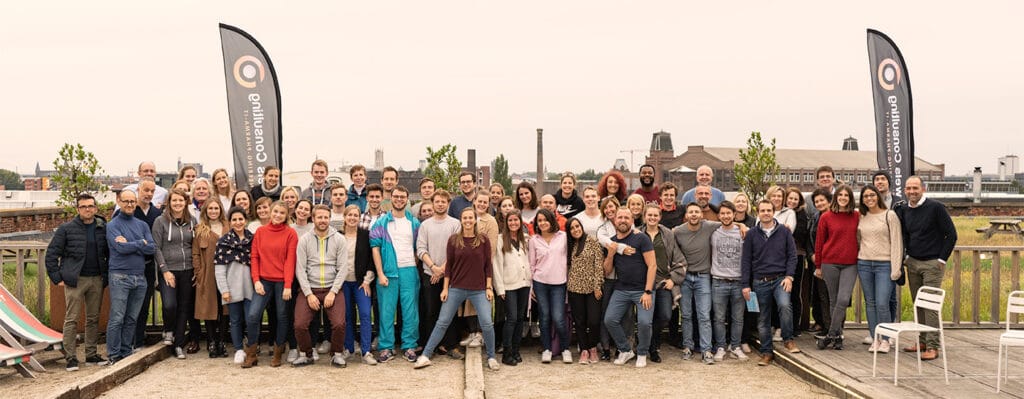Search: “”
We found 315 results for your search.
News
Six Sigma Yellow Belt: still a hot topic in consultancy
News
We are ISO:9001 certified: why is this good news?
Insights
Avoiding the Car Crash of Knowledge Loss
Discover the importance of knowledge transfer and organizational development, as external consultants seamlessly integrated into workflows help mitigate the disruptive effects of retirement. Delve into sustainable strategies for knowledge transfer and talent management. Take part in the dialogue to reshape the future of talent management and create a meaningful, long-lasting impact.
Imagine driving for the first time a car with just written directions. How long would it take before you hit a wall? That’s why a live aid comes into play. An instructor is there with you every step of the way. They don’t just tell you; they also observe, correct, and encourage you. They make a potentially disastrous situation a great learning opportunity by their expertise and real-time guidance.
Knowledge centers
In the same way, integrating learning into the workflow in our professional lives requires more than written pre-read instructions. As a keynote speaker at our latest Pauwels Consulting Customer Round Table, Cathleen Heimberg of Showpad, a renowned Learning & Development Specialist, made this point. Pharma, biotech, and engineering industry representatives contributed to the discussion with their unique perspectives. We explored not only knowledge curation but also how external consultants play a crucial role as “a drive instructor” in these processes, as well. And while the concept of “knowledge centers” is a solution to most of our customers we should not shy away from admitting the considerable challenges that come with implementing these platforms.

“When the consultant leaves, we need to start all over again.” This sentiment is one that echoes through organizations across industries when external consultants complete their engagements and bid farewell. The departure of a consultant can often leave behind a void, disrupting the workflow and creating a sense of starting from scratch. This phenomenon highlights the need for a more sustainable and integrated approach to knowledge transfer and organizational development.
The impact of natural de-staffing
The departure of external consultants is not the only challenge organizations face when it comes to knowledge transfer and organizational development. Our customers bring an additional dimension to this problem, particularly with the natural de-staffing caused by the retirement of their own workforce. One of our customers is currently confronting a significant knowledge drain, as a whole generation of baby boomers, who constitute one-third of their workforce, is set to retire within the next two years. This impending wave of retirements further emphasizes the importance of implementing sustainable strategies for knowledge transfer and ensuring the continuity of operations.
Our panel of customers addressed how the knowledge drain resulting from impending retirements, organizations can benefit from the involvement of subject matter expert consultants. These consultants play a crucial role in organizing, maintaining, and distributing knowledge transfers for customers who are facing significant workforce changes due to retirement. “Embedded” consultants possess a deep understanding of the organization’s specific needs and can develop tailored strategies to capture and preserve critical knowledge. By actively engaging in the transfer of expertise, these consultants help mitigate the disruption caused by retirements, ensuring a smoother transition and minimizing the sense of starting from scratch. Their expertise and dedication contribute to a more sustainable and integrated approach to knowledge transfer and organizational development, enabling organizations to effectively navigate the challenges posed by an aging workforce.
Talent management and knowledge curation
The panel acknowledged that the absence of a well-planned knowledge transfer mechanism means that organizations must retrace their steps and rebuild the understanding from scratch. Tom Kiebooms, our senior consultant, and subject matter expert in MES and Digitalisation, shared his ground-level experiences, reinforcing the critical importance of talent management and knowledge curation. A small detail can make all the difference; when a Pauwels Consulting employee attends a training, it’s common for his colleagues who work directly for our customers to attend as well.
Having the consultant aboard embeds the knowledge into the workflow and the main reason for this is known to all: we’re losing the war for talent. As one senior panelist put it: “We’re fighting for talent using methods that failed last time.” A point challenged by Koen De Borle, Business Unit Manager Training Programs at Pauwels Consulting. Talent is available, but it needs to be reskilled to be a perfect match for the customers. In comes the Training Program: new ways of working require us to upskill and reskill ourselves, particularly when it comes to self-management skills such as active learning, flexibility, leadership, and social influence. To meet the ambitions and talent of customers, Pauwels Consulting creates training programs tailored to the needs of today’s clients and focusing on the expertise of tomorrow.
Shared talent pools
Koen De Borle concludes: ‘It is no longer the case that staffing is just a solution to a resource problem. Consulting as a service not only satisfies urgent organizational needs, but also contributes to our customers’ strategic growth. In the ongoing war for talent, knowledge sharing in workflows, talent pools shared among multiple customers, and subject matter experts play a vital role in customer success. Establishing communities of practice or internal networks can facilitate the exchange of knowledge and experiences among employees. These forums provide a platform for ongoing learning, collaboration, and problem-solving. By nurturing a culture of knowledge-sharing, organizations can minimize the impact of consultant departures and foster a sense of collective expertise.”

The collaborative approach outlined above is not only essential for ensuring business continuity but also a recipe for achieving substantial return on investment (ROI) for our customers. It begins by actively listening to the explicit and implicit needs of our clients. Whether we call it co-business development or by any other name, a tailored approach is the X factor that differentiates true success for all parties involved from mere staffing solutions. By understanding and addressing the unique requirements of each customer, we can deliver outcomes that go beyond mere resource provision and create long-term value. This customer-centric approach forms the foundation for building lasting partnerships and achieving mutual success.
5 moments of need
This collaborative mindset brings us back to the hypothetical exercise of driving a car with only written instructions. Cathleen Heimberg introduced the panel to the “5 Moments of Need” learning and development methodology, developed by Conrad Gottfredson and Bob Mosher. This method focuses on addressing performance needs at the moment of learning and the moments of applying or changing knowledge in the workflow. As a certified 5MoN Designer she pointed out the five different learning needs of a person.
- New: When individuals are learning something for the first time.
- More: When individuals need to deepen their knowledge or skills.
- Apply: When individuals need guidance while performing a task or applying knowledge.
- Change: When individuals need support to adapt to a change in processes, tools, or technologies.
- Solve: When individuals encounter a problem and need to troubleshoot or find a solution.
Solutions that work are according to Cathleen Heimberg:
- Blend Learning Modalities: Utilize a blended learning approach to deliver training content. Combine traditional training methods, such as instructor-led sessions or e-learning courses, with performance support tools, job aids, microlearning, and on-the-job training. This enables employees to access the right information and support at the moment of need.
- Integrate with Workflow: Integrate training materials and resources directly into the workflow to make them easily accessible. This can include embedding job aids or knowledge repositories within software applications, providing quick-reference guides, or using mobile apps that offer on-demand learning and performance support.
- Provide Just-in-Time Support: Offer performance support tools or resources that can be accessed at the moment of need. This might include interactive online guides, videos, searchable knowledge bases, or chatbots that provide real-time assistance and answers to questions.
- Continuous Reinforcement: Implement strategies to reinforce learning and encourage continuous improvement. This can involve ongoing assessments, knowledge checks, performance reviews, refresher courses, communities of practice, or mentoring programs.
- Measure Effectiveness: Regularly evaluate the effectiveness of training interventions by measuring performance improvements, employee feedback, and business outcomes. Use this data to refine and improve the training programs over time.
Training in the workflow
Koen De Borle describes this as vital underlaying principles in the Pauwels Consulting training program. “The key is to make training resources easily accessible, contextual, and available at the point of need. By integrating training with the workflow, employees can seamlessly access the information they require, reducing the time spent searching for answers and enabling them to perform tasks more effectively, a vital underlaying principle in the Pauwels Consulting training program.”
This customer round table has resulted in all panel members seeing an opportunity to transform knowledge sharing and embrace a new approach that will help both our consultants and their customers succeed in the future. It was evident that the enthusiasm in the room was palpable as we concluded the thought-provoking session. The commitment to advancing our industries and fighting the talent war is unwavering. The journey does not end here. During the second session, we will continue this vital dialogue and gain even more insights into talent management. Together, we can reshape the future of talent management and make a lasting impact.








